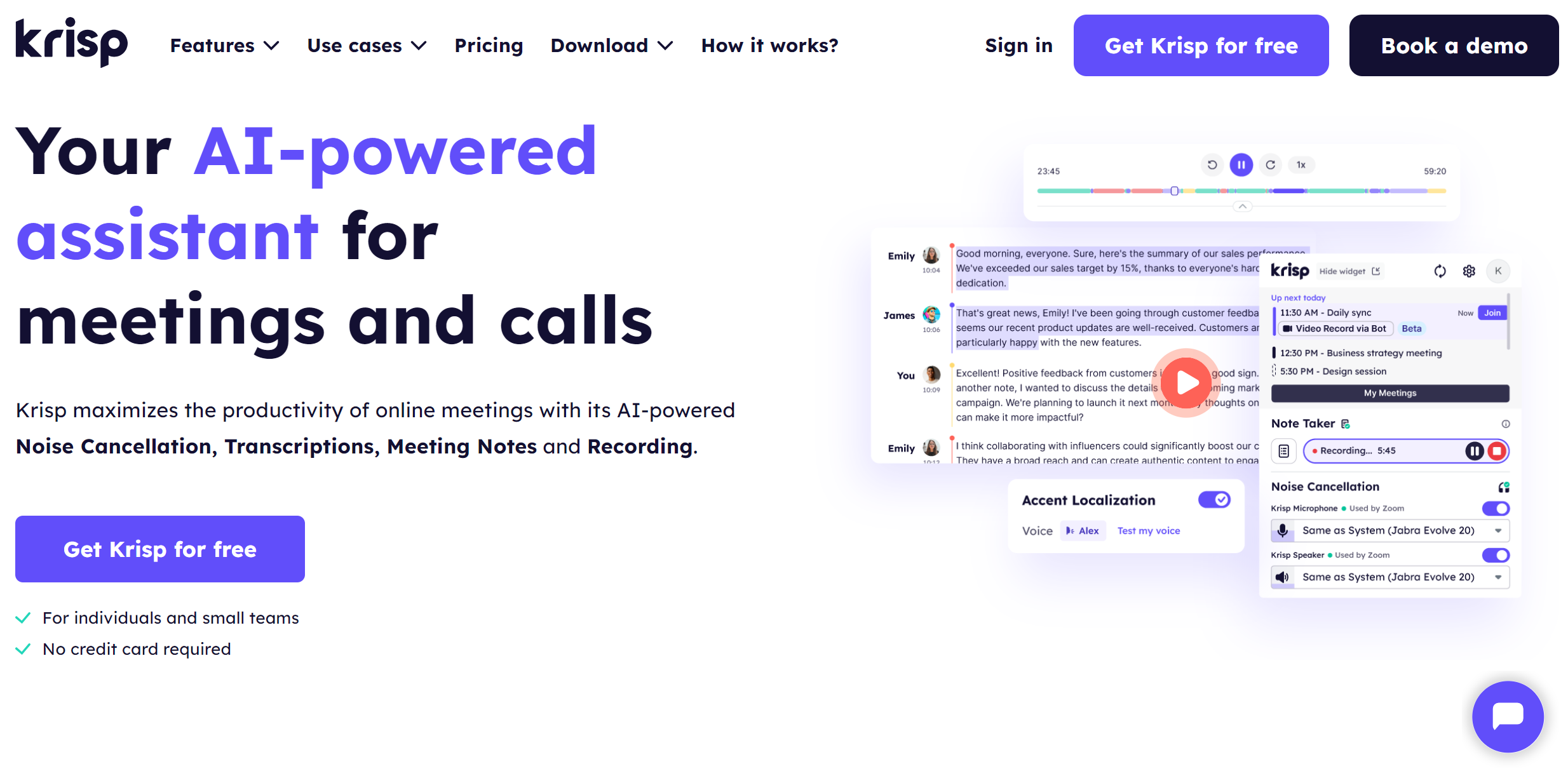An engaging, effective onboarding experience helps new hires integrate quicker and more smoothly into their new environment. And a new hire questionnaire helps new team members feel part of the team, which is as essential as feeling competent professionally.
So, what are good questions to ask a new hire to make onboarding successful? In this article, you’ll find the top 55 questions, including general background and fun onboarding questions for new hires. Moreover, you’ll learn what a new team member questionnaire is, why it’s essential, and how to create one effectively.
Finally, you’ll unveil how Krisp AI Meeting Assistant makes online hiring processes exceptionally productive in a world where the emphasis on AI integration is on the rise.
What Is a New Hire Questionnaire?

A new hire questionnaire is also called a new employee questionnaire, new team member survey, new employee survey, employee onboarding survey, or onboarding questionnaire.
A new employee questionnaire is an HR tool to gather information about new team members, set expectations, and build effective communication. Hiring managers use this employee welcome questionnaire during a personal one-on-one meeting at the start of their first day. Responses can be anonymous or named.
This first-day survey helps employers understand work preferences, goals, and onboarding experiences. Additionally, it collects feedback on workplace culture, allowing organizations to improve engagement.
New Hire Questionnaire Example
Here is a valuable new team member survey that helps improve the onboarding experience for future employees. You can make a template using the questions and convert the file into a new hire questionnaire PDF to use as a structured document. After all, the PDF format is easy to distribute, complete, and store digitally for reference.
Personal and Job Information
- Full Name: _______________________
- Job Title: _______________________
- Start Date: _______________________
- Department: _______________________
- Manager’s Name: _______________________
Work Preferences & Goals
- What motivated you to join this company?
- What are your top three professional strengths?
- What skills or training could help you advance in your role?
- What are your career goals in the next one to three years?
- How do you prefer to receive feedback from your manager?
Onboarding Experience
- How would you rate your onboarding experience so far? (1-5)
- Did you receive all the necessary resources and tools to start your job? (Yes/No)
- Were company policies and expectations clearly explained to you? (Yes/No)
- What could be improved in the onboarding process?
- Is there anything to help you feel more comfortable in your role?
Company Culture & Work Environment
- How welcoming has the team been since your arrival?
- Do you feel comfortable communicating with your manager and colleagues? (Yes/No)
- What aspects of our company culture stand out to you?
- Are there any challenges you’ve faced in adapting to the workplace?
- Do you have any suggestions for improving team collaboration?
Additional Feedback
- What has been your biggest highlight since joining?
- Do you have any concerns or questions about your role?
- How can we support your success in the company?
- What suggestions do you have for improving the new hire experience?
- Any final thoughts or feedback?
Why Is a New Hire Questionnaire Important?
A good onboarding process is about understanding the psychological process that people go through during this initial stage. And psychological safety is often lacking when it’s needed most. Did you know that new hires’ psychological safety erodes quickly?
Benefits of New Hire Questionnaire
Here is how a new team member survey helps HR managers make the onboarding process psychologically safe:
- Give a warm welcome to new team members to boost their confidence and help them feel at home and part of the family.
- Give new hires a good impression of the company. Specifically, introduce new hires to leadership, share the company’s vision, and explain how their roles contribute to success.
- Make new hires feel welcome from the beginning. For example, send a personalized welcome email and take them to lunch, making them feel valued from day one.
- Encourage new employees to open up. As a result, teams will get to know each other better and establish a culture of trust and transparency. For instance, Ask them about their strengths and preferences.
- Identify their needs to provide the resources or tools they need for the job. For instance, ask them if they need specific software or training to perform at their best.
- Help new team members avoid potential misunderstandings and navigate challenges. For this, set clear expectations and offer a mentor program to help them understand their roles and adapt to the company culture without confusion.
- Identify new hires’ strengths and areas for improvement. For instance, identifying new team members’ strong communication skills can allow you to assign them to lead client meetings.
- Successfully integrate new hires into their teams. Specifically, consider using virtual icebreakers for remote onboarding or team-building activities to help new hires connect with colleagues and collaborate comfortably from the start.
- Improve the onboarding experience by ensuring a smoother transition for new hires. Namely, the new hire survey can help identify areas for improvement and refine the new team member training process.
- Provide effective support during the early days of employment, leading to higher job satisfaction and lower turnover rates. Specifically, a structured onboarding makes new employees feel supported, confident, and excited to grow within the company.
- Make new employees feel valued, encouraging them to stay with the company long-term. For example, regular check-ins and appreciation from leadership reassure new hires that they’re in the right place for long-term career growth.
Top 55 Questions to Ask a New Hire in an Interview

These questions help assess a new hire’s skills, cultural fit, work ethic, and long-term goals, ensuring a successful onboarding process. It’s important to schedule several meetings to discuss how new team members are progressing, their struggles, and whether they have questions or concerns.
1. General Background and Experience
- Can you tell us about yourself and your professional background?
- What attracted you to this role and our company?
- What skills and experience make you a good fit for this position?
- What are your strengths, and how will they help you in this role?
- Can you describe a challenge you faced in a previous role and how you handled it?
2. Job Role and Expectations
- What do you know about our company and its mission?
- How do you see yourself contributing to our team’s success?
- What are your expectations for this role in the first three months?
- How do you prioritize tasks and avoid missing deadlines?
- What support or resources do you need to be successful in this role?
3. Work Ethic and Productivity
- How do you handle multiple projects at once?
- What strategies do you use to stay organized?
- Can you describe a time you worked under pressure?
- How do you handle constructive feedback?
- What motivates you to perform at your best?
4. Teamwork and Collaboration
- How do you prefer to collaborate with colleagues?
- Can you share an example of when you worked successfully in a team?
- How do you handle conflicts with coworkers?
- What qualities do you value in a team leader or manager?
- How do you make team communication effective?
5. Company Culture and Values
- What type of work environment helps you thrive?
- How do you handle workplace challenges or setbacks?
- What company values are most important to you?
- How do you adapt to changes in a company’s culture or structure?
- How do you contribute to a positive and inclusive work environment?
6. Leadership and Decision-Making
- Have you ever taken the lead on a project? How did it go?
- How do you make critical work-related decisions?
- Can you describe a situation where you had to think critically?
- What leadership qualities do you possess?
- How do you motivate yourself and others around you?
7. Technical and Job-Specific Questions
- What software or tools are you proficient in?
- Can you explain a complex concept related to your field in simple terms?
- How do you stay updated on industry trends and developments?
- Have you completed any certifications or professional training?
- What technical challenges have you faced in your past roles?
8. Problem-solving and Critical Thinking
- Can you share an example of when you had to solve a complex problem?
- How do you approach troubleshooting or identifying the root cause of an issue?
- Describe a time when you had to make a quick decision.
- How do you evaluate risk when making a decision?
- Have you ever suggested an improvement at work? What was the outcome?
9. Customer Service and Client Relations
- How do you handle demanding customers or clients?
- Can you describe a time when you went above and beyond for a client?
- What strategies help you understand customer needs?
- How do you handle client feedback, both positive and negative?
- What steps do you take to ensure a high-quality customer experience?
10. Career Goals and Future Plans
- Where do you see yourself in five years?
- What are your professional development goals?
- How do you plan to grow within this company?
- What skills would you like to develop in this role?
- How can we support you in your career growth?
11. Fun Questions for New Hires
- If you could have dinner with any historical figure, who would it be and why?
- What’s a fun fact about you that most people don’t know?
- If you could switch jobs with anyone in the company for a day, who would it be and why?
- What’s your dream vacation destination, and what would you do there?
- If only three emojis could help describe yourself, which ones would you choose and why?
How to Create a New Hire Questionnaire: Best Practices and Tips
Today’s work trends, such as AI-first organizations and loneliness as a business risk, are shaping the rapidly evolving landscape. Rapid technological advancements and shifting workforce dynamics require managers to choose the right fit for their companies.
So, it’s no wonder that the role of quality workplace entry questions, including strategic interview questions, is growing across companies. Here is how to structure a quality new employee welcome survey:
1. Explain why new team members should answer onboarding questions
Let new hires realize they help shape a better experience for themselves and future employees.
2. Explain the importance and purpose of the new hire questionnaire
For instance, let new hires know their answers improve the onboarding experience, address challenges early, and encourages open communication.
3. Know when to use the new hire questionnaire
The right time can help gather vital feedback. Specifically:
- First week (initial impressions)
- 30 days (early feedback)
- 60 days (deeper integration)
- 90 days (comprehensive review)
- Quarterly or annually (ongoing check-ins)
4. Avoid too personal or inappropriate questions
Namely, focus on job-related topics like onboarding experience, role clarity, and workplace satisfaction. Avoid inquiries about age, marital status, religion, or health.
5. Welcome new employees and gather essential details
Specifically, ask for basic personal information, work experience, expectations, and preferred communication style.
6. Make your new hire questionnaire concise but comprehensive
Ensure your employees don’t get bored while filling it out. Namely, limit the survey to 10 well-structured questions that cover essential onboarding aspects without overwhelming new hires.
7. Pick questions that align with broader HR and business goals
This will help gather valuable data for HR planning. For example, “Do you feel motivated to do your best work every day? Why or why not?” or “Do you feel comfortable expressing your ideas at work?”
8. Include multiple-choice questions to gather easy-to-analyze data
For instance, “How would you rate your overall onboarding experience so far? Excellent, Good, Average, or Needs Improvement?
9. Add open-ended questions
They allow employees to share personal feedback, suggestions, and concerns. For instance, “What was the most helpful part of your onboarding experience, and why?” or “What challenges have you faced in your first few weeks, and how can we better support you?
10. Don’t ask leading questions in the new hire questionnaire
These questions push survey participants to answer a certain way based on biases and personal opinions. For instance, the question, “How much did you enjoy our fantastic event?” implies that the event was fantastic.
11. Make decisions based on your data
Collect data on employee experiences, challenges, and engagement. Data-driven decisions ensure continuous improvement, boost employee satisfaction, and foster a more productive work environment.
Bonus Tip 1: Screening interviews help determine whether the candidate should progress to the next stage of the hiring process. So, make sure to pick the right screening interview questions as well.
Bonus Tip 2: Questions to ask at the end of the interview are no less important for new hires. So, prepare at least two or three questions to demonstrate your interest in the company and role.
How Krisp Makes Online Interviews Productive

Did you know that increased flexibility at work and the ability to design your job are major trends in the workforce landscape in 2025? Other trends include AI integration and automation, employee well-being and engagement, and diversity.
Thus, using technologies like Krisp AI Meeting Assistant during remote interviews and collaboration becomes more vital. Krisp is designed with productivity and efficiency in mind to boost flexibility, automation, and diversity and improve work-life balance.
Krisp AI Meeting Assistant offers:
- AI Meeting Recording with unprecedented audio quality to record discussions for future reference
- AI Noise Cancellation with the most powerful noise suppression to enjoy distraction-free online interactions
- AI Meeting Transcription with an exceptional 96% accuracy to avoid appending time and effort on manual note-taking
- AI Meeting Notes & Summaries without errors to save key discussion points and action items
Benefits of Using Krisp in Virtual Interviews and Remote Collaboration
According to a survey by world-famous PwCon on the way we work today, 88% of HR professionals cite technology breakthroughs and demographic shifts (74%) as major trends in 2025. Additionally, 49% believe employees will work for several employers.
Thus, HR managers need to efficiently manage the increasingly diverse career landscape. And companies need to successfully operate amid rapid technological advancements and shifting workforce dynamics.
Thankfully, Krisp’s features enable hiring managers to organize remote interviews, including screening interviews, and collaborate effectively.
Benefits of Krips’s AI Meeting Assistant for Remote Work and Interviews
- Boosts team morale, reduces employees’ anxiety and makes onboarding a success.
- As a result, team members, including new hires, get a sense of belonging and feel part of a group.
- Feeling part of a family encourages teams to work for the good of the group instead of just themselves.
- Seamlessly integrate AI to maintain integrity and fairness in the workplace and elevate team norms, such as strong communication and collaboration.
- Boost employee well-being, reducing loneliness for remote workers. Unfortunately, loneliness is growing as a major factor affecting employee performance and engagement.
- Integrate employees with diverse backgrounds from all over the world, increasing diversity.
- Fight challenges associated with growing demographic shifts, such as communication difficulties. These shifts are tremendously impacting remote workforce and working practices.
- Increase flexibility at work by allowing new hires to participate in online interviews and collaborate from anywhere.
- Let managers offer lifestyle incentives, such as working from home and flexible working hours, which are becoming more critical.
- Digitize HR operations, such as sourcing, interviewing, hiring new employees, and using their data to understand the workforce. HR operations are projected to become fully digital.
- Develop a strong and compelling company culture through seamless communication. And this is increasingly a differentiator and distinctive factor in engaging and retaining employees.
TIME’s top pick for note-taking apps without an in-meeting bot, Krisp AI Meeting Assistant runs on WinOS and MacOS. Moreover, Krisp’s AI Meeting Assistant works well with videoconferencing tools like Zoom, Goole Meet, and Microsoft Teams.
Krisp’s flagship Noise Cancellation technology is already operating on 200M+ devices and processing 80B+ minutes of conversations daily.
Asking the Right Questions for New Hire Interview Is Key
A new hire questionnaire helps employers gather key insights on job expectations, skills, and onboarding experiences.
A quality new team member survey ensures smooth integration, identifies challenges early, and enhances employee engagement. As a result, it helps create a welcoming and supportive work environment.
Importantly, Krisp AI Meeting Assistant makes onboarding smoother through seamless online communication and productive remote interactions.
Frequently Asked Questions
A new employee survey should include questions about:
- Onboarding experience
- Role clarity
- Training needs
- Company culture
- Team collaboration
- Job satisfaction.
Asking about challenges faced, necessary resources, and improvement suggestions helps managers enhance future onboarding processes.





